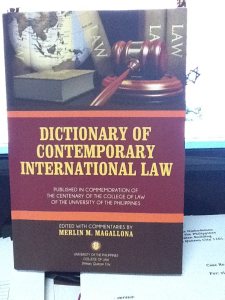By H. Harry L. Roque, Jr.
(The article below first appeared yesterday in my column View from Malcolm Hall for the Manila Standard Today. You may also read in my main blog.
 At 2:15 Tuesday afternoon, 15 victims of the Ampatuan massacre filed a P15-million damage suit versus Gloria Macapagal-Arroyo. The victims had three causes of action: one, aiding and abetting the Ampatuans for the massacre; two, violation of their constitutional rights (the rights to life and freedom of the press of the victims); and three, command responsibility.
At 2:15 Tuesday afternoon, 15 victims of the Ampatuan massacre filed a P15-million damage suit versus Gloria Macapagal-Arroyo. The victims had three causes of action: one, aiding and abetting the Ampatuans for the massacre; two, violation of their constitutional rights (the rights to life and freedom of the press of the victims); and three, command responsibility.
Aiding and abetting as a means of acquiring liability was first recognized in the Nuremberg tribunal. The very first individuals found guilty for it were the officers and directors of a company that manufactured the gas used in the notorious gas chambers used by the Nazis in pursuit of their final solution: the annihilation of the Jews. The officers and directors of the company may not have directly killed the Jews themselves, but the genocide could not have happened without the chemicals which they supplied. Yet another conviction for aiding and abetting was in a case decided by the International Tribunal for the former Yugoslavia. There, a man was physically present when another was torturing a detainee. The court ruled that even if the bystander did not personally perform any torturous act, he is still liable because he did nothing to stop the criminal act.
Why aiding and abetting against Arroyo?
The victims argued that she is liable for aiding and abetting because she legitimized the private army of the Ampatuans through an executive order that absorbed them as “force multipliers” of the Armed Forces of the Philippines. The victims also argued that she supplied these members of the private army with the arms and the bullets used to kill the victims of the massacre. Finally, she was responsible for the sense of impunity by which the massacre was committed precisely because she endowed the clan with tremendous influence. This arose from the peculiar role that the Ampatuans played for Arroyo in Maguindanao that is now the subject of prosecution for electoral sabotage. In fact, it appears that Arroyo stole the presidency from Fernando Poe, Jr. largely through the Ampatuan machinery in the province.
The cause of action based on command responsibility is a principle borrowed from International Law. When Yamashita, the “tiger of the Malayas” was being prosecuted by Philippine authorities for war crimes at the end of the war, he invoked the defense that he did not order the crimes to be committed and that he did not even know that the crimes were being committed. Here, the Philippine Supreme Court held that as a commander, Yamashita was duty bound to adopt a sound system to ensure that his troops were in compliance with the law all the time. On appeal to the US Supreme Court, the court formulated the principle as it stands today: commanders —or Presidents—are responsible for the acts of their subordinates under their control when they knew or should have known that the crimes were about to be committed and they did nothing to prevent them.
The contention of the widows is that Arroyo knew the kind of violence that the Ampatuan clan was capable of. In fact, her Cabinet members warned Toto Mangudadatu about their violent nature. Moreover, the blocking force that intercepted the ill-fated convoy was in place as early as November 19, 2009 and yet, Arroyo, as commander-in-chief, did nothing to prevent the massacre from happening.
We do acknowledge that these are tough allegations and causes of action to prove. But what do the victims have to lose? Two years after the massacre, only 93 of 197 accused have been arrested, and only 64 of the accused have been arraigned. At this pace, it would take more than double the lifetimes of the victims before justice can be accorded them. Meanwhile, we cannot sit idly by and merely tell the victims how truly unfortunate they are. I have always maintained -as a lawyer and a law professor- that there is always an effective legal remedy for those whose legal rights have been violated. For now, the civil suit appears to be their only effective and speedy, or at least, their speediest remedy.
On the occasion of the second anniversary of the massacre, Malacañang spokespersons should go beyond saying that President Benigno Aquino III will merely ensure that the public prosecutors are not the reason for the delay in the prosecution of the case. It is still the task of the Executive to apprehend those are still at large so that witnesses, whose lives are already in danger, should not be made to repeat their testimonies over and over again to identify yet another accused arraigned or arrested. Malacañang should know too that the Pareno study funded by the Asia Foundation has already concluded that it is primarily because of the lapses within the executive branch that is responsible for the impunity accorded to killers in our society. Certainly, it is the burden of the Executive to reform the criminal justice system to ensure that victims of the massacre, and all other victims of extralegal killings: the Ortegas, Evangelistas, Barramedas etc., are all accorded their rights to an effective and speedy remedy under local laws and the right to receive compensation.
The tendency of the President’s spokespersons to pass the buck will only exacerbate rather than end the culture of impunity.






